Related Research Articles
Syed Kamal (Urdu: سیّد کمال;, often just known as Kamal, was a Pakistani film and TV actor, producer and director.
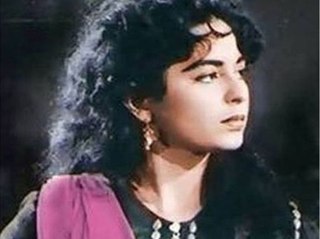
Sabiha Khanum, was a Pakistani film actress. She is also known as the "First Lady of Pakistani Cinema", and is often recognized for her role in Pakistani cinema during the 1950s and 1960s. The recipient of the Pride of Performance and Nigar Awards, she debuted in Lollywood films with Beli (1950), and also appeared in television dramas.
Husna was a Pakistani actress in the late 1950s to 1970s, who worked in Pakistani cinema. She made her debut in 1958 and mostly appeared in supporting roles in films. She was the recipient of the Nigar Award for Best Supporting Actress in 1972.
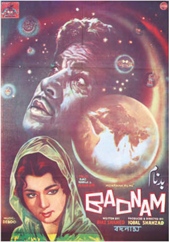
Badnaam is a Pakistani film in Urdu language, released on 2 September 1966, adapted from Saadat Hasan Manto's short story Jhumkay ("Ear-rings") by screenwriter Riaz Shahid, and was the second film adaptation of the Manto's story after 1946 Bollywood adaptation. The film was directed and produced by Iqbal Shehzad, in his debut as a film director. Badnaam's cast included Allauddin, Nabeela, Neelo, Ejaz Durrani, Diljeet Mirza, Hameed Wain, Rangeela and Zumurrud.
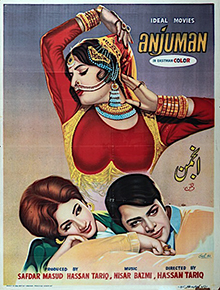
Anjuman is a Pakistani colour film released on 31 July 1970, starring Waheed Murad, Rani, Deeba, Santosh Kumar, Sabiha Khanam and Lehri. The film was released during the hey days of Murad and became a milestone in his career. The film was produced by Safdar Masud under the banner Ideal Movies and directed by Hassan Tariq, a well-known Pakistani film director.

Hero is a 1985 Pakistani action film starring Waheed Murad, Babra Sharif, Mumtaz, Aslam Pervaiz, Saqi, Adil Murad and Nadeem. It was produced by Waheed himself and directed by his close friend Iqbal Yousuf. Waheed Murad died leaving this film incomplete. It was later completed by Iqbal Yousuf using 'cheat shot' techniques and released after two years of Waheed's death on 11 January 1985 countrywide.

Baharo Phool Barsao, is a 1972 Pakistani Urdu-language romance film produced and directed by Indian director Mehmood Sadiq. He had come from India to produce and direct this film, but died halfway through its production. It was later completed by the Pakistani film director Hassan Tariq.
Aslam Parvez was a Pakistani film actor.
Anwar Kamal Pasha, was the pioneer in the Pakistan film industry and an early Pakistani film director and producer from Lahore, Pakistan.
Hassan Tariq was a Pakistani film director, film producer and screenwriter who was famous for making films like Anjuman, Kaneez, Baharo Phool Barsao and Devar Bhabi.
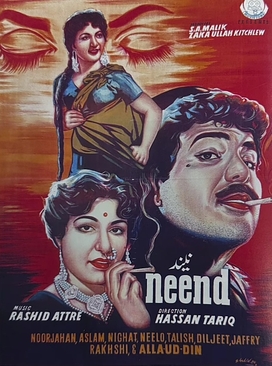
Neend (transl. Sleep) is a Pakistani drama film directed by Hassan Tariq in his directorial debut and released in 1959. Based on a story and screenplay by Riaz Shahid, the films stars Noor Jehan, Neelo and Aslam Pervaiz with Nighat Sultana, Allauddin and Agha Talish in supporting roles. The music was done by Rashid Attre while Noor Jehan also sang her own songs in the film.
Suryya Bhopali is a Pakistani musical romantic film directed by Hassan Tariq, who also wrote the screenplay. The film stars Rani in title role, alongside Shahid, with Waheed Murad in a supporting role. It tells the story of a qawali singer from Bhopal who falls in love with the son of a Nawab when she is invited to perform at the Nawab's residence. The film's song "Tha Yaqeen Ke Ayainge" gained widespread popularity. The music was composed by A. Hameed, features performances by Mehdi Hassan and Nahid Akhtar.
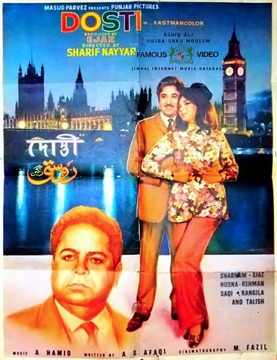
Dosti is a 1971 Pakistani romantic musical film directed by Sharif Nayyar and produced by Ejaz Durrani who also played the leading role in the film along with Shabnam and Abdur Rahman (actor). The film was released on 7 February 1971, was Diamond jubilee success at box office. It was also released in the UK. The film was shot in Northern areas of Pakistan and the UK.
Daman Aur Chingari is a 1973 Pakistani Urdu romantic drama film directed by Shabab Kiranvi. The film included a heavy superstar cast including Zeba, Muhammad Ali, and Nadeem to depict a triangle love story. Other notable actors were Aliya, Munawar Zarif, Allauddin, and Aslam Pervaiz. Daman Aur Chingar won a Nigar Award in the best editor category.
Behan Bhai is a 1979 Pakistani film directed by Nazar Shabab and written by Shabab Kiranvi and produced by A. Hameed.

Ashiana is a 1964 Pakistani film directed by S. M. Yusuf, who also co-produced it.

Seeta Maryam Margaret is a 1978 Pakistani Urdu-language film directed by Hassan Tariq. It is written by Agha Hassan Imtisal with music composed by A. Hameed. It features Rani in the titular roles with Muhammad Ali, Talish, Nayyar Sultana, Qavi and Deeba in prominent roles with Shahid in a special appearance.
Sangdil is a 1982 Pakistani film directed by Hassan Tariq and written by Syed Noor and produced by A. Hameed. It stars Nadeem, Babra Sharif and Bindiya in leading roles.
References
- 1 2 3 4 5 6 7 8 9 Aijaz Gul (18 March 2017). "Behan Bhai (1968 film) - a film review". The News International newspaper. Archived from the original on 17 March 2023. Retrieved 29 August 2024.
- 1 2 3 Alan Goble. "Behan Bhai (1968 film)". Complete Index To World Film (CITWF) website. Archived from the original on 16 February 2020. Retrieved 29 August 2024.
- ↑ Muhammad Zahid (8 May 2016). "Spotlight: World's greatest mums". Dawn newspaper. Archived from the original on 16 October 2022. Retrieved 29 August 2024.
- 1 2 "Pakistan's "Oscars": The Nigar Awards". The Hot Spot Film Reviews website. 24 November 2017. Archived from the original on 13 June 2020. Retrieved 9 July 2022.